The Venezuela Quagmire
On April 30th, newspapers across the world declared that a coup was underway in Venezuela which looked likely to depose current president Nicolas Maduro and replace him with opposition leader and self-declared president Juan Guaidó. As the day progressed, it became increasingly clear that the attempt to remove Maduro had fizzled as key members of the military remained loyal to the sitting president.
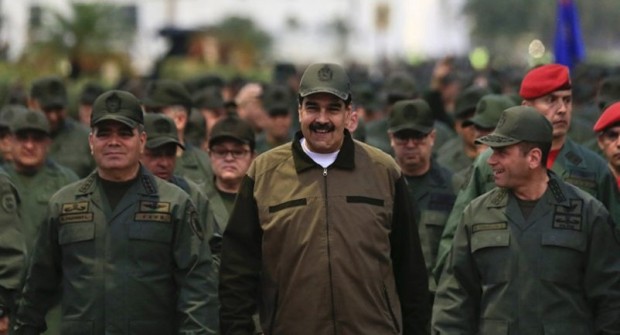
Nicolas Maduro parades with loyal troops who thwarted a coup attempt.
This latest development was yet another manifestation of the extreme chaos through which Venezuela has been passing since Maduro took over the presidency after Hugo Chavez, the charismatic president who had led the “Bolivaran Revolution” succumbed to cancer in 2013. Since then, the country has been wracked by civil strife and its citizens have been reeling from insecurity and generalized hunger as the economy has essentially collapsed.
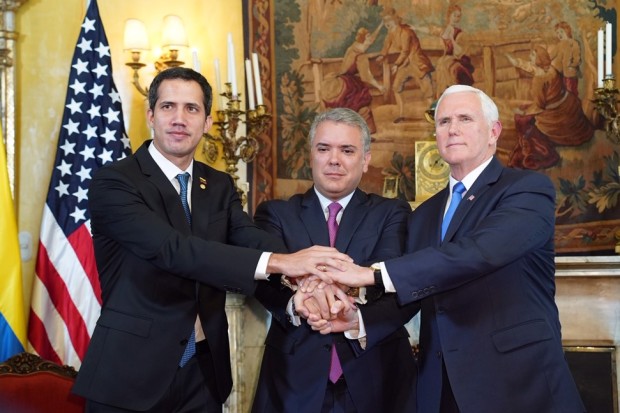
Juan Guiadó with US vice-president Pence and Colombian president Márquez.
Defenders of the government claim the instability to be the cause of outside, “imperialist” interference, an attempt by the capitalist world to snuff out any attempts to ameliorate the conditions of society’s most vulnerable members. When Guaidó, the then president of the Congress, alleging widespread fraud in the 2018 election won by Maduro, declared himself president, he was recognized by over 50 countries, including the US and many Latin American nations. This fact is used by the government’s sympathizers as proof of a foreign plot to dislodge Maduro from power and install a regime more favorable to western interests.
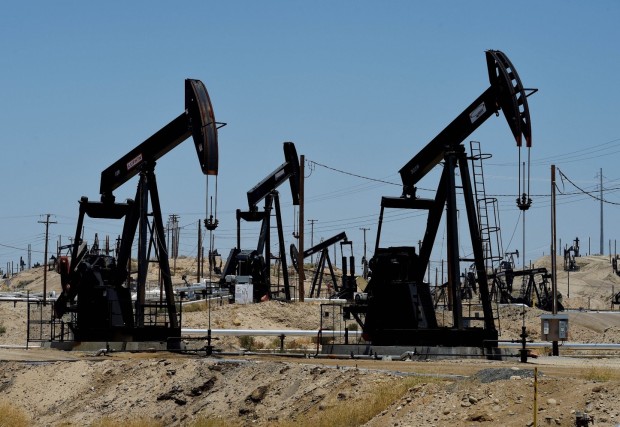
Despite being blessed with the world’s largest oil reserves, the Venezuelan economy is in tatters
Those opposed to Maduro claim that he has led this country, which has the largest petroleum reserves in the world, on a downward spiral towards penury and a breakdown of the social order. The Bolivaran Revolution, they allege, has resulted in a brutal dictatorship where dissention is violently stifled and the purported beneficiaries of this so-called revolution are bearing the brunt of the resulting hardships. The disintegration of Venezuela is causing regional instability as the millions fleeing the turmoil have spilled over into Colombia (over a million) and Brazil, straining the already overburdened social services of those countries. Any solution to this malaise, they posit, must involve Maduro´s removal from power.
A black and white analysis of this critical situation misses the nuances and offers simple solutions to extremely complicated problems.
The first is, why isn’t Venezuela a rich country? With a relatively small population for a large territory and massive oil reserves, there is no reason for poverty to exist. Hugo Chavez first came to prominence leading an attempted coup in 1992 after food riots and street unrest, provoked by the imposition of austerity programs mandated by the IMF, illustrated public frustration with the economic status quo. Chavez was put in prison but released before the 1998 election which he handily won and embarked on his Bolivaran revolution intended to ensure a fairer distribution of the country´s wealth.
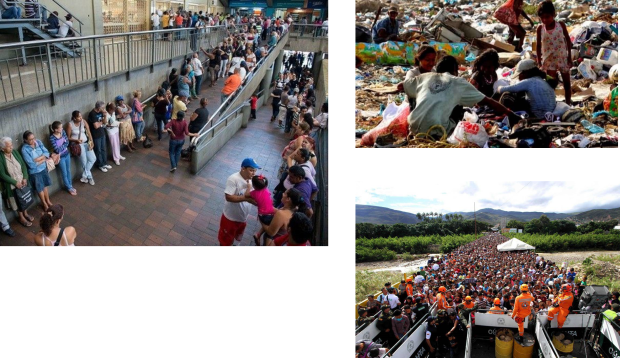
Venezuelans queue for food at a supermarket, rummage through garbage and amass at the border to leave the country
The first years of Chavez’s tenure were largely successful in the sense that for the first time in history, the poor were actually benefitting from Venezuela’s riches with greater access to food, health, housing and education; the Human Development Index for the country grew impressively. This rise in living standards was bolstered by rising oil prices and Chavez’s charisma and widespread projection in the country (he had a weekly radio program, Talking with the President, that lasted up to six hours) led to his re-election in 2000.
This was followed in 2002 by a failed coup attempt against him, widely believed to have been backed by the US, which gave Chavez the excuse to claim, as he drifted to ever more strongman rule, that all opposition to him was merely that of US lackeys intent on pilfering the country’s national wealth and transferring it elsewhere. He altered the Constitution to ensure there was no time limit to his rule and surrounded himself with sycophants to flatter him and henchmen to protect him.
It is difficult to maintain the momentum of revolutions by charismatic figures such as Chavez when their principal architect disappears from the scene. From the start, Maduro tried to emulate his predecessor and most would say failed miserably. Falling oil prices and widespread economic mismanagement fueled the current situation which has been deemed as unsustainable.
However, despite all the adverse conditions, the opposition has as yet been unable to get rid of Maduro. This is partly due to its demographic make-up, consisting as it does of the whiter middle classes whom many of the poor blame for never fairly sharing the economic pie. The latest failed coup attempt is yet another example of how the image of the opposition is besmirched by its supposed links to Venezuela´s enemies.
Something will have to give. It is clear, however, that unless key members of the military abandon Maduro and defect to the opposition. Nobody seems to be able to predict if and when that might happen.
The Abortion Divide
Abortion once again has emerged as an issue which hugely divides Americans. The Roe v Wade decision of 1973 legalized the procedure and has ever since created an arena where the “cultural war,” is being waged. This schism in US society over these issues, such as abortion, gun rights, gay rights/marriage, quotas for minorities, transgender issues, the role of religion in school among others reflects conflicting views of social values and behavior.
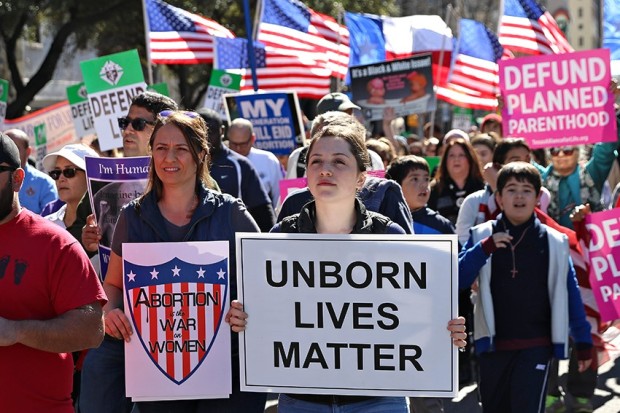
For those in the US who favor a woman’s choice to have an abortion, these are trying times. The Georgia State legislature passed a law prohibiting abortions after a heart beat is detected. This usually occurs at around six weeks, a time at which a woman may have no idea she is pregnant. Alabama then passed a law outlawing abortion even in the circumstances of rape and incest. And Arkansas, another southern state, has given rapists the right to impede their victims from having an abortion.
In the case of Alabama, one of the motives of the state legislature was the certainty that this draconian law would provoke judicial resistance and the courts would eventually send the case to the Supreme Court. Then for the first time, Roe v Wade would be revisited, this time in a Supreme Court where the conservative bloc has a majority.
If the law were to be overturned by the nation’s highest court, the decision would go back to the states, and in more conservative states abortion would likely be banned, and in more liberal ones, it would remain legal.
Before 2000, President Donald Trump was in the pro-choice camp, but he realized that to be successful in the modern Republican Party, being pro-life (anti-abortion) is a prerequisite given the party’s reliance on the white, religious right.
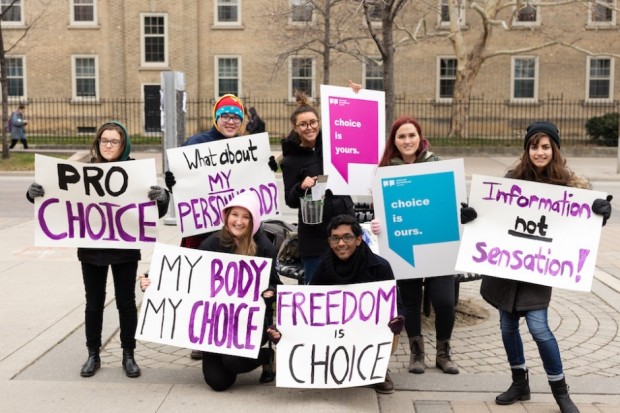
This group has turned a blind eye to Trump’s documented predatory sexual behavior, saying we are all sinners and deserve forgiveness, because Trump is giving them exactly what they want. The appointment of conservative justices for the Supreme Court (Trump has delivered two already and might have the chance to appoint more) who would overturn not just Roe v Wade, but a host of other laws conservatives find unacceptable, has buoyed the right. This has ensured that 90% of the religious right’s votes go to Trump. He has also appointed scores of extremely conservative judges to the lower courts, many of them who will be around for decades.
Trump’s other fulfilled campaign promises to his base include moving the US embassy from Tel Aviv to Jerusalem, revoking the Iranian nuclear deal, and getting tough with China. Just as Trump has said himself, he could shoot someone dead on Fifth Avenue and these people would still love him.
The controversy of abortion and other social questions has been fracturing the US society for decades and with a president who plays on resentment and prejudice, the chasm is widening. There are eerie parallels to the civil war period where inability to agree on fundamental issues caused the US’s mostly deadly conflict, known as the Civil War or War of Secession. Statesmen and stateswomen are needed, yet are apparently not abundant.